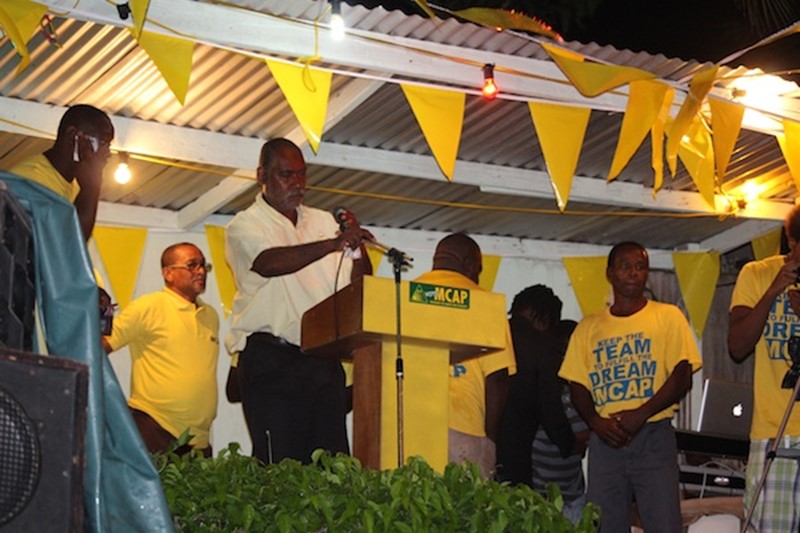
Elections 2014 are now over for Montserrat, yet the post election debates still dominate the landscape. In the post analysis of the election results, it is always a healthy exercise to examine the factors that may have contributed to either party’s victory or loss at the polls.
The two parties, MCAP and PDM fought a keenly contested election. However, the incumbent MCAP were resoundingly sent packing by the electorate. The degree to which MCAP lost was shocking to many. What though could have been the key factors that played a significant role in MCAP losing?
I will share a few thoughts as the four most potentially dangerous roads MCAP trod in the just concluded elections. The ideas being expressed here will also form part of an upcoming book to be released in 2015.
Sharing the Wealth
Before the election campaign got into full swing, this issue of sharing the wealth was already being positioned to be a central theme. It was in some ways surprising to see that the incumbent Team MCAP did not have a firm enough strategic response to this idea of sharing the wealth that their opponents were planning to use.
Earlier in the year for instance, former Parliamentary Secretary, Jermaine Wade, made the following statement in a March sitting of the Legislative Assembly where he said; “Everyone’s talking about spreading the wealth. What spreading the wealth they talking about? The wealth will spread when the time is right!”
That statement by Wade was a significant blunder of rhetoric. It may perhaps not be that he was saying people should wait for the wealth to share, but the perception mattered. The impression relayed from that statement was telling.
In a free and democratic society we hold fast to a strong belief that every person is equal and has the right of access to attain wealth and the continual ability to create wealth. Therefore, it was careless that Wade would deem to make such a pronunciation that bordered on the obscene. The statement was tantamount to a predication of restrictions on the economic freedoms of hard working, aspiring Montserratians. Wade, even in post comments on the campaign trail seemed not to understand that his comments may have led some to believe he was for selective wealth distribution. Perception in politics is half of the battle either won or lost.
Did MCAP Portray an Elitist Mentality?
Following the statement made by Charles Kirnon in a July sitting of the Assembly; “People should buy what they need and not what they want.” That understandably created a firestorm amongst many individuals who heard it. Kirnon’s bold statement that Montserratians should restrict their aspirations for wanting better lives, better social conditions, better economic conditions and sacrifice indefinitely, left many questions hanging.
Grenada’s Prime Minister Mitchell told his people in a national address earlier in 2014, to sacrifice for the country three years of salary freeze for public servants, as times were tough economically.
Kirnon’s statement, coupled with ex Premier Meade being asked in an interview how long should people on Montserrat sacrifice for, and giving no definitive answer; that in some ways raised the question of how secure were the incumbents in their own economic re-development plan? Was sacrifice from Montserratians expected to be made indefinitely? Or was MCAP working to a timescale that was reasonable and responsible? That was hardly communicated effectively.
Then Meade further confounded the idea that MCAP is a party of elitist mentality when he continued to expound on the idea of past criminals being involved in the electoral process. Unfortunately, societies are not build upon do-gooders only, and Meade’s continuation of belittling members of the society who he was in charge of, left ideas that he was either contemptuous of them, or he was looking to score some very cheap political points.
Appearance of Unity?
Colin Riley is being pilloried in some circles for now allegedly speaking out against MCAP. But was MCAP’s unity truly a believable idea beyond their party faithful?
Two members came into MCAP in seemingly direct competition with Riley. One is known to have openly called Riley a “liar” in a previous forum, and the other talked about health issues on the same platform as the sitting Minister of Health. Riley must surely have felt that clearly, the party hierarchy have shown him the ultimate disrespect.
Additionally, ideas of MCAP’s unity were in question from the previous year. It was suggested prior to the start of 2014, just after Hon David Osborne resigned from MCAP, that for former Premier Meade to convince voters that his administration deserves a second term, he would have looked to bring a message of unity within his ranks as a key selling point. The point was raised that Meade and MCAP would sell this idea of stability and unity, as they would have needed to have pushed that theme as what Montserrat required at this critical juncture in its redevelopment.
That message of unity was always in peril considering the 'sheltered disharmony' that was believed to have existed within MCAP. When Riley was asked by the media on several occasions about his relationship with Meade, his obvious discomfort in answering was clear.
The Fallacy of The Dream
"Keep the Team To Fulfil The Dream." said MCAP.
As the sitting government, MCAP were always going to be under the more intense scrutiny. It is the nature of the political process. Once those seeking office have a record - good or bad - it will be examined repeatedly. MCAP’s challenge was one where the perception existed that they started many projects, but the financial effects of this, “more money” in the economy did not reach many people.
The contention from MCAP’s challengers was that cronyism, favouritism and one-manism ran rife. Particularly, the focus on Hon Reuben T Meade was blatantly obvious. His political challengers interestingly saw him as being the main target, as it was his governance style that they found issues with. Meade in my view could have easily overcome this, but the issue rested in MCAP’s communication strategy. They made a fundamental error.
During the election, MCAP's candidates spoke about all the projects they did. But it was never about what MCAP did or did not do; the projects they did or did not start.
The election was mainly about the economic hardship felt by a cross-section of the community despite all the projects taking place. This was the issue and the question staring MCAP was were they for all the people, or just those who supported them?
MCAP in many ways, it can be said, wrongly framed their ideas for continuation in government in the concept of a dream. The reality of those who struggled to make ends meet did not fit the concept of a dream, and for that section of voters, the disconnect began there in the slogan that was repeated often on radio and on the platform from MCAP.
Furthermore, MCAP’s challenge was not to simply show competence in governance. It was not to show that they could speak and negotiate with the best of them regionally and internationally. The challenge was a local one, shaped in the homes of those experiencing hardship and tough economic times. The challenge for Meade and his group was to show that MCAP truly cared and recognised its errors and accepted that many citizens were experiencing real economic pain, despite all the capital projects that they touted as their key achievements. The question remained throughout the whole election if they truly understood this and cared enough to change.
Voters questioned if they could have changed. Sadly they did not convince voters enough they could have done this.
There are other factors also to consider, but these will be explored in the upcoming book as aforementioned.


